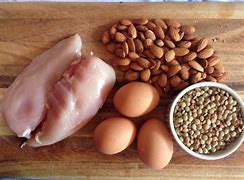If you want to lose weight, you’ll probably need to increase your protein. Many people who are trying to lose weight reduce their calories but also reduce their protein intake as well. Making this mistake usually dooms their weight loss efforts. Don’t make the same mistake. In this article I will explain how eating more protein can help you lose weight, as well as how much protein you need, and why high-quality sources of protein can all help you shed unwanted pounds and lose weight fast. Athletes already know the health benefits of a high-protein diet, and you can experience those same health benefits when you modify your diet to focus on protein.
Proteins Health and Weight Loss Benefits
How exactly does increasing your protein help you lose weight? Here are the top three reasons you can enhance your weight loss efforts by eating a high-protein diet.
#1. Protein keeps you feeling fuller longer.
Proteins increase your sense of satiety, and when you include high-protein foods in your meals, you won’t get hungry as quickly after eating. When you feel fuller, you are less likely to overeat or snack later on. Also, feeling full means you won’t reach for other foods that may be higher in calories but lack the nutritional value your body needs. Proteins are also broken down more slowly than carbohydrates, which means your blood sugar will not fluctuate as much, and you won’t get cravings for sweets and other high-calorie foods.
#2. Protein helps you build muscle, which can enhance your metabolism.
Your muscles need the amino acids in protein to build and become strong. When you have more muscle mass, you burn more calories, as well. Eating protein before and after working out can help your muscles repair faster, decreasing your recovery time, and helping you feel strong and healthy. Having more lean muscle is a fitness goal that will definitely boost your weight loss efforts.
#3. Digesting protein burns more calories.
Proteins are harder for your body to process than carbohydrates or even fats. So, when you eat protein, you actually burn more calories digesting the food in your system. This process is known as thermogenesis. If you are trying to lose weight, this is good news, as your body must work harder to digest the more complex proteins than, the simpler compounds found in carbohydrates.
When you increase protein in your diet, you can enjoy other benefits, including a healthier heart, brain, and bones. The amino acids in proteins are necessary for all metabolic functions in your body, so eating plenty of this important macro-nutrient is essential for good health.
How Much Protein Should I Eat?
Determining how much protein you need varies by your gender, age, body size, activity level, and health goals. The USDA recommends a minimum of 46 grams of protein per day for women and 56 grams of protein per day for men, but these are the recommended bare minimums your body needs to avoid deficiencies. These daily minimums are meant for a person of moderate activity level and average weight who is trying to maintain their status.
If you are trying to lose weight, and especially if you are exercising regularly as a part of that weight loss strategy, then you will want to eat more protein than these minimum levels. To determine how much protein you need, start with your current body weight. Divide that by two.
If you are moderately active but trying to lose weight, multiply that number by 0.75 to determine your daily protein intake in grams.
Therefore, someone who weighs 200 pounds would aim to eat a maximum of 150 grams of protein per day if they are very active, work out a lot, or are in training. That same person should only consume about 100 grams of protein per day if their activity level is more moderate.
If you are not the kind of person who counts grams of anything, you may want to consider a different approach. For each meal or more substantial snack you eat, a good rule of thumb for high-protein weight loss is eat no more than 30 percent of your calories from protein, less than 25 percent from healthy fats, and the remainder of your calories should come from carbohydrates.
Sources of Quality Protein
If you have decided to increase your protein to lose weight, then you need to select quality sources of protein. The best sources of quality protein come from whole foods that include:
- Eggs – 6 grams per egg
- Greek Yogurt – 23 grams per 8 oz serving
- Cottage Cheese – 14 grams per ½ cup
- Tuna – 25 grams per 3 oz serving
- Salmon – 23 grams per 3 oz serving
- Chicken breast – 24 grams per 3 oz serving
- Turkey breast – 24 grams per 3 oz serving
- Steak – 23 grams per 3 oz serving
- Navy beans – 29 grams per 1 cup serving
- Lentils – 13 grams per ¼ cup serving
- Peanut butter 8 oz per 2 tbsp serving
- Edamame 8 grams per ½ cup
Creating a whole-foods diet that is focused on higher levels of protein for weight loss can not only help you lose the extra weight but also benefit your health in many ways. A diet that is rich in vegetables, fruits, lean proteins, and healthy fats is the foundation of a healthy body, no matter your fitness or weight loss goals.

